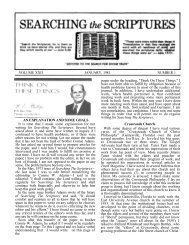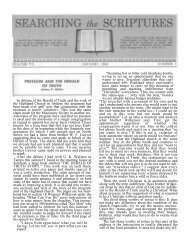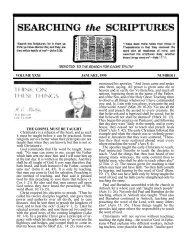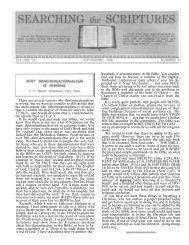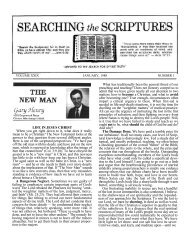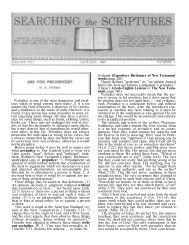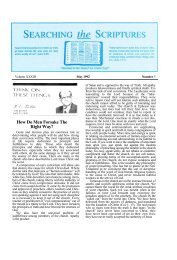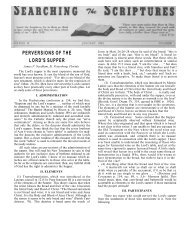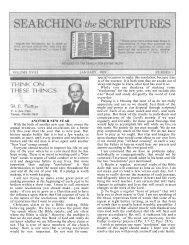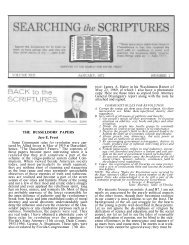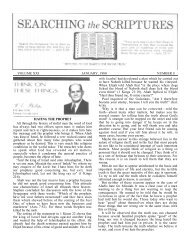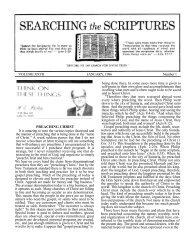In Ephesians 5:22-33, Paul drew an analogy between the ...
In Ephesians 5:22-33, Paul drew an analogy between the ...
In Ephesians 5:22-33, Paul drew an analogy between the ...
Create successful ePaper yourself
Turn your PDF publications into a flip-book with our unique Google optimized e-Paper software.
____________________________________________________________________________________________________ Page 7<br />
The thrilling responsibility of this assignment entails<br />
<strong>an</strong>alysis of <strong>the</strong> lengthy context, <strong>Ephesi<strong>an</strong>s</strong> 1:3-14, as it<br />
complements <strong>the</strong> <strong>the</strong>sis in verse three. "Blessed be <strong>the</strong><br />
God <strong>an</strong>d Fa<strong>the</strong>r of our Lord Jesus Christ, who hath<br />
blessed us with all spiritual blessings in heavenly places<br />
in Christ" (1:3). The extent, nature, <strong>an</strong>d relationship<br />
where God has, before <strong>the</strong> fact, decided to bestow every<br />
blessing will, hopefully, st<strong>an</strong>d out more clearly. Proper<br />
perception will surely generate within each Christi<strong>an</strong> a<br />
th<strong>an</strong>kfulness of heart <strong>an</strong>d fulness of spirit which will<br />
cause a rising up to cry out, "blessed be <strong>the</strong> God <strong>an</strong>d<br />
Fa<strong>the</strong>r of our Lord Jesus Christ."<br />
God is <strong>the</strong> author of "all" or "every" blessing; <strong>the</strong>ir<br />
nature <strong>an</strong>d sphere is spiritual; <strong>the</strong> medium through<br />
whom we have <strong>the</strong>m is Jesus Christ. Thus we must<br />
immediately conclude that this text addresses not <strong>the</strong><br />
natural blessings of God, but <strong>the</strong> fruit of <strong>the</strong> redemptive<br />
work of Christ. "Every" blessing includes all <strong>the</strong> Fa<strong>the</strong>r<br />
intended <strong>an</strong>d c<strong>an</strong> bestow; all <strong>the</strong> Son c<strong>an</strong> provide; all <strong>the</strong><br />
Spirit c<strong>an</strong> apply. The conspiring of Deity is here embraced<br />
in <strong>the</strong> blessings to those in Christ.<br />
"Heavenly places," or, in <strong>the</strong> heavenlies, in <strong>the</strong> very<br />
nature of <strong>the</strong> expression is <strong>the</strong> idea of <strong>an</strong> exalted spiritual<br />
relationship, <strong>the</strong> highest of <strong>the</strong> high. A relationship<br />
into which God had brought <strong>the</strong>se of <strong>the</strong> Ephesi<strong>an</strong><br />
church, into which all in Christ are brought. This is <strong>the</strong><br />
church as perceived within <strong>the</strong> eternal purpose of God<br />
<strong>an</strong>d revealed in <strong>the</strong> New Testament. <strong>In</strong>deed, it is in<br />
Christ that all spiritual blessings are received. To be in<br />
Christ is to be in <strong>the</strong> church which is a reserved <strong>an</strong>d<br />
peculiar relationship to God through Christ where, <strong>an</strong>d<br />
only where, <strong>the</strong> redeemed obtain all spiritual blessings.<br />
"<strong>In</strong> Christ" produces <strong>an</strong> overriding idea of fellowship.<br />
Every spiritual blessing we have received, <strong>the</strong> exalted<br />
spiritual relationship in which <strong>the</strong>y are received, is all<br />
contingent upon our relationship with Christ. The keynote<br />
of <strong>the</strong> whole epistle is unity of all in Christ. Things<br />
in heavens <strong>an</strong>d in earth, Jew <strong>an</strong>d Gentile, all are one in<br />
him. It is <strong>the</strong>n, by reason of this "in Christ," that we<br />
attain to <strong>the</strong> highest of <strong>the</strong> high where all spiritual<br />
blessings are. <strong>In</strong> this section of <strong>the</strong> text <strong>the</strong>se words seem<br />
to express <strong>the</strong> very heartbeat of <strong>the</strong> apostle. The sentence<br />
beginning in verse three runs continuously<br />
through fourteen <strong>an</strong>d is marked all <strong>the</strong> way by m<strong>an</strong>y rich<br />
<strong>an</strong>d happy turns of expression. The bottom line, however,<br />
is redemption, this epitomizes <strong>the</strong> work of Christ<br />
<strong>an</strong>d <strong>the</strong> ultimate provision of <strong>the</strong> grace of God.<br />
What God purposed <strong>an</strong>d decided in respect to m<strong>an</strong>'s<br />
redemption, <strong>the</strong> choice made, was in deference to those<br />
in Christ, (verse four). While nothing is said as to<br />
whe<strong>the</strong>r those chosen are chosen conditionally or unconditionally,<br />
verse five makes <strong>the</strong> choice "according to <strong>the</strong><br />
good pleasure of his will." God foreordained <strong>the</strong> provisions<br />
of salvation <strong>an</strong>d decided before <strong>the</strong> fact of salvation<br />
what it would take on his part as well as m<strong>an</strong>'s. He<br />
decreed <strong>the</strong> conditions which m<strong>an</strong> had to meet if he was<br />
to be saved <strong>an</strong>d enjoy all spiritual blessings. Every m<strong>an</strong><br />
is free to choose, whe<strong>the</strong>r to reject or accept <strong>the</strong> conditions<br />
of God for salvation. The chosen ones are distinct<br />
in character, "holy <strong>an</strong>d without blame." The intimation<br />
is not that God makes one so by his direct power. Ra<strong>the</strong>r,<br />
God has chosen <strong>the</strong> class as object of his abiding love <strong>an</strong>d<br />
leaves it to every m<strong>an</strong> to decide whe<strong>the</strong>r he will be in that<br />
class or group. Fur<strong>the</strong>r, <strong>the</strong> only way to be "holy <strong>an</strong>d<br />
without blame" is to be "in him," in Christ, <strong>the</strong> idea of<br />
fellowship again.<br />
Verse five introduces <strong>the</strong> idea of adoption by God<br />
through Jesus Christ. Adoption is a term of relationship,<br />
sonship in respect to st<strong>an</strong>ding. It is <strong>the</strong> taking of a child<br />
not one's own by birth to be a son, a legal heir, with all<br />
rights <strong>an</strong>d obligations to that relationship. Sonship in<br />
Christ, here argued by <strong>Paul</strong>, is a new relationship<br />
founded upon <strong>the</strong> "good pleasure of his will." Through<br />
Jesus Christ <strong>the</strong> will of <strong>the</strong> Fa<strong>the</strong>r is executed, <strong>the</strong><br />
conditions of which not only provide for sonship but<br />
every blessing of sonship, every spiritual blessing.<br />
What are some of those spiritual blessings which<br />
are reserved for a holy <strong>an</strong>d blameless class, those in<br />
Christ, in fellowship with him <strong>an</strong>d all involved? While<br />
our list will not be exhaustive, gle<strong>an</strong>ings from this<br />
context will stir appreciation <strong>an</strong>d provoke a more extensive<br />
consideration. Redemption is certainly to be of<br />
primary consideration, <strong>the</strong> forgiveness of sins, which is<br />
<strong>the</strong> consummate expression of God's rich grace (verse<br />
seven). Actually, all spiritual blessings revolve within<br />
<strong>the</strong> fact of forgiveness. It is in Christ, through his death<br />
that redemption is made possible. Redemption involves<br />
<strong>the</strong> idea of rescue from bondage. M<strong>an</strong> is in bondage to<br />
sin, Jesus died to redeem from that bondage, by his<br />
death made release possible. Let us not lose sight of <strong>the</strong><br />
fact, however, that redemption is only to those who<br />
accept it on <strong>the</strong> terms offered. Redemption accordingly<br />
to <strong>the</strong> riches of God's grace, while available to all, must<br />
be appropriated.<br />
Jesus shed his blood, this was <strong>the</strong> ultimate price he<br />
willingly paid to redeem sin-cursed m<strong>an</strong>. "For this is my<br />
blood of <strong>the</strong> new testament, which is shed for m<strong>an</strong>y for<br />
<strong>the</strong> remission of sins" (Mt. 26:28). "Being justified freely<br />
by his grace through <strong>the</strong> redemption that is in Christ<br />
Jesus: whom God set forth to be a propitiation, through<br />
faith in his blood, to show his righteousness because of<br />
<strong>the</strong> passing over of <strong>the</strong> sins done aforetime, in <strong>the</strong><br />
forbear<strong>an</strong>ce of God; for <strong>the</strong> showing, I say, of his righteousness<br />
at this present season; that he might himself<br />
be just, <strong>an</strong>d <strong>the</strong> justifier of him that had faith in Jesus"<br />
(Rom. 3:24-26). Redemption was provided in Christ <strong>an</strong>d<br />
only in <strong>the</strong> death of God's own son, was God able to be just<br />
<strong>an</strong>d at <strong>the</strong> same time justify <strong>the</strong> guilty. <strong>In</strong> so doing he<br />
showed abhorrence for sin <strong>an</strong>d love for <strong>the</strong> guilty of sin,



